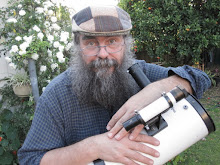Tuesday, April 09, 2019
The Sky This Week - Thursday April 11 to Thursday April 18
The First Quarter Moon is Saturday April 13. Mars is
visible low in
the evening skies and is close to the Hades cluster making a second eye for Taurus the Bull.
Jupiter is low in the late evening skies.
The morning skies feature four bright planets Jupiter, Saturn, bright
Venus and Mercury. Venus and Mercury are closest this week on Wednesday the 17th.
The First Quarter Moon is Saturday April 13. The Moon is at perigee on the 17th.
Morning sky on Saturday, April 13 showing the whole sky as seen from Adelaide at 5:42 ACST (60 minutes before sunrise). Four bright planets can be seen. Jupiter and Saturn are high above the northern horizon. Venus and Mercury are above the eastern horizon.
Similar views will be seen elsewhere in Australia at the equivalent local time (60 minutes before sunrise).
Morning sky on Wednesday, April 17 looking east as seen from Adelaide at 5:45 ACDST (60 minutes before sunrise). Venus and Mercury are at their closest
Similar views will be seen elsewhere in Australia at the equivalent local time (60 minutes before sunrise).
Sky at 23:00 ACST on Saturday, April 13 looking east as seen from Adelaide. Jupiter is low above the eastern horizon. The left upper insert inset shows the telescopic view of Jupiter at this time
Similar views will be seen elsewhere in Australia at the equivalent local time .
Evening sky on Saturday, April 13 as seen looking north-west from
Adelaide
at 18:50 ACST (60 minutes after sunset). Mars is the brightest object
above the western horizon
The Pleiades and Hyades also grace the north-western sky. Mars is close to the Hyades and the bright red star Aldebaran, forming a second eye for Taurus the Bull.
Similar views will be seen throughout Australia at the equivalent local time (60 minutes after sunset, click to embiggen).
Venus is bright in the morning skies below Jupiter and Saturn and above Mercury. Mercury moves closer to Venus over the week and is closest to Venus on the 17th.
Mercury climbs higher in the morning sky and is visible below Venus and is closest to Venus on the 17th.
Jupiter Jupiter is now rising just before midnight in the evening sky, but is low to the horizon and not a good telescope target until the morning.
Mars moves through Taurus and is the brightest object in low in the western evening sky. Mars sets around 7:30pm. Mars is close to the Hyades and the bright red star Aldebaran, forming a second eye for Taurus the Bull.
Saturn is climbs higher in the morning sky. It is in an excellent position for telescopic viewing in the early morning.
Printable PDF maps of the Eastern sky at 10 pm AEDST, Western sky at 10 pm AEDST. For further details and more information on what's up in the sky, see Southern Skywatch.
Cloud cover predictions can be found at SkippySky.
Here is the near-real time satellite view of the clouds (day and night) http://satview.bom.gov.au/
The First Quarter Moon is Saturday April 13. The Moon is at perigee on the 17th.
Morning sky on Saturday, April 13 showing the whole sky as seen from Adelaide at 5:42 ACST (60 minutes before sunrise). Four bright planets can be seen. Jupiter and Saturn are high above the northern horizon. Venus and Mercury are above the eastern horizon.
Similar views will be seen elsewhere in Australia at the equivalent local time (60 minutes before sunrise).
Morning sky on Wednesday, April 17 looking east as seen from Adelaide at 5:45 ACDST (60 minutes before sunrise). Venus and Mercury are at their closest
Similar views will be seen elsewhere in Australia at the equivalent local time (60 minutes before sunrise).
Sky at 23:00 ACST on Saturday, April 13 looking east as seen from Adelaide. Jupiter is low above the eastern horizon. The left upper insert inset shows the telescopic view of Jupiter at this time
Similar views will be seen elsewhere in Australia at the equivalent local time .
The Pleiades and Hyades also grace the north-western sky. Mars is close to the Hyades and the bright red star Aldebaran, forming a second eye for Taurus the Bull.
Similar views will be seen throughout Australia at the equivalent local time (60 minutes after sunset, click to embiggen).
Venus is bright in the morning skies below Jupiter and Saturn and above Mercury. Mercury moves closer to Venus over the week and is closest to Venus on the 17th.
Mercury climbs higher in the morning sky and is visible below Venus and is closest to Venus on the 17th.
Jupiter Jupiter is now rising just before midnight in the evening sky, but is low to the horizon and not a good telescope target until the morning.
Mars moves through Taurus and is the brightest object in low in the western evening sky. Mars sets around 7:30pm. Mars is close to the Hyades and the bright red star Aldebaran, forming a second eye for Taurus the Bull.
Saturn is climbs higher in the morning sky. It is in an excellent position for telescopic viewing in the early morning.
Printable PDF maps of the Eastern sky at 10 pm AEDST, Western sky at 10 pm AEDST. For further details and more information on what's up in the sky, see Southern Skywatch.
Cloud cover predictions can be found at SkippySky.
Here is the near-real time satellite view of the clouds (day and night) http://satview.bom.gov.au/
Labels: weekly sky







 Click to read about or order
Click to read about or order Click to read about or order
Click to read about or order Click to read about or order
Click to read about or order Click to read about or order
Click to read about or order




